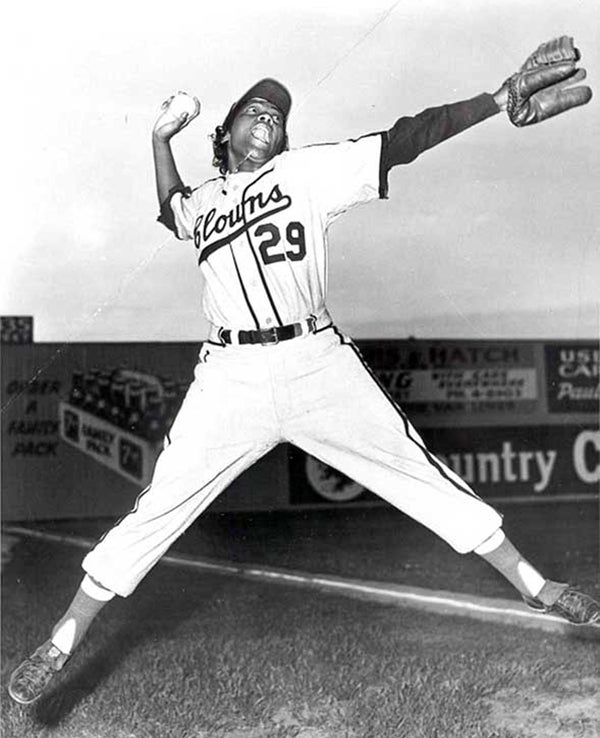If you like Mo’ne Davis, you’ll love baseball trailblazer Toni Stone

During Black History Month, as we remember the achievements of African-Americans who have faced opposition in their lives, there are still names that should be known but aren’t — like Toni Stone, the first woman to play men’s professional baseball.
During Black History Month, it’s become customary to remember the achievements and contributions made by African-Americans who have faced some form of opposition over the course of their lives. Names like Thurgood Marshal, Sojourner Truth, W.E.B. DuBois, and Harriet Tubman come to mind instantly, as their accomplishments have been woven into the rhetoric of Black history “education” in today’s school systems. But there are still names that ought to be known and aren’t — names like Toni Stone, the first woman to play men’s professional baseball.

Toni Stone, the first female professional baseball player, is shown in this undated file photo. (AP Photo/Courtesy of Negro Leagues Baseball Museum)
Born Marcenia Lyle Stone on July 17, 1921, in St. Paul, Minnesota, Toni “Tomboy” Stone excelled in baseball early in life, playing local, sandlot-style ball against and alongside her male peers. The All-American Girls’ Professional Baseball League (AAGPBL), made popular by the 1992 film “A League of Their Own,” was exclusively white, and there were no women’s Negro League teams for Stone to try out for. During the quagmire of Jim Crow America, Stone’s relocation to the west coast to help an ailing sister gave her the opportunity to play real ball.
It is prudent to note that records within the Negro League contained conflicting information, as the process was not nearly as formal or organized as white major leagues. In the case of Toni Stone, this misinformation was intentional to increase her appeal to fans in an attempt to fill ball parks. What we do know is that Stone joined the barnstorming semi-pro team, the San Francisco Sea Lions in 1949, before joining the New Orleans Creoles later that year. By 1953 she had joined the Indianapolis Clowns, becoming the first woman to play professionally in the Negro League.
Comparable to basketball’s Harlem Globetrotters, the Clowns initially began as a gimmick team, but by 1952 the club began playing straight baseball. Attendance and interest in Negro League baseball had dropped considerably since Jackie Robinson’s appearance in the major leagues in 1947, so when Hank Aaron’s departure to the Boston Braves left the Clowns’ second-base slot open, adding a woman to their roster not only added to the spectacle, but Stone’s unique level of sportsmanship distinguished her even further.
By this time, Stone had married Aurelious Alberga, a man 40 years older than her, who was openly unsupportive of her athletic endeavors. This was reflected nearly everywhere Stone went, receiving jeers from the stands that demanded she “go home and fix her husband some biscuits.” Her teammates were no better behaved, bombarding her with sexism on and off the field. Still, the team publicized Stone in interviews, on posters, and on the cover of the Clowns’ program.
While boasting stats like appearing in 50 games in 1953 with a batting average of .243, owner Syd Pollock sold Stone’s contract to the Kansas City Monarchs in 1954, where she spent most of her time on the bench alongside the men who hated her. The decline of Negro League baseball continued, and Stone retired at the end of the season. She returned to her husband’s bedside and cared for him until his death in 1987 at the age of 103. Stone lived until the age of 75, passing Nov. 2, 1996.
Last summer, Philly’s own Mo’ne Davis of the Taney Dragons became the first girl to earn a win and pitch a shut-out in Little League World Series history. She is also the first African-American girl to appear in the Little League World Series, as well as the first Little League player to appear on the cover of Sports Illustrated. Perhaps Toni Stone may still not be a name that’s heard alongside DuBois, Hughes, Ellington, Truth, and Tubman, but her groundbreaking impact in sports, and American history, lives on.
WHYY is your source for fact-based, in-depth journalism and information. As a nonprofit organization, we rely on financial support from readers like you. Please give today.

